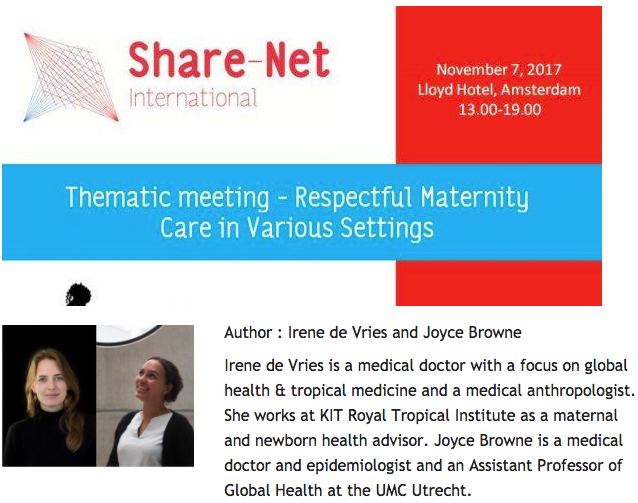Bridging the gap between global policy and local practice of respectful maternity care
After a long time of insufficient attention, respectful maternity care (RMC) is finally a growing field of interest in global maternal health practices, discussions, and publications. Whilst practitioners, researchers and policy makers aim to adapt and implement these guidelines to local contexts, in daily reality many women around the world still lack respectful care. In this blog we share how interdisciplinary discussions at a national level can lead to tangible recommendations for policy and practice.
Disrespectful maternity care is a barrier to accessing maternal health services, leading to an increased risk of complications and associated maternal and perinatal morbidity and mortality. Attempts to define what respectful maternity care (RMC) entails resulted in increased understanding of the concept—but a universal definition is lacking. Recently the perspective on RMC shifted from not being solely the absence of disrespect and abuse (also referred to as ‘obstetric violence’) to additionally include the provision of fundamental human rights, including the rights to information, privacy, dignity, equity, support, autonomy, and quality of care. Global public health leaders translated and integrated this into guidelines and recommendations for practice, but in daily reality many women around the world still lack this respectful care.
To raise awareness about the importance of RMC among a wide range of stakeholders and to bridge the gap between global policy and local practice, over 70 practitioners, policy makers, and researchers came together in Amsterdam in November 2017 to discuss RMC and construct practical recommendations. The meeting was an initiative of several Dutch stakeholders with an interest in global and maternal health and facilitated by Share-Net International. Contributions came from WHO’s Department of Reproductive Health and Research, the International Confederation of Midwives (ICM), and clinicians, researchers, and human rights activists from the Netherlands and the global south.
First, discussion about cultural diversity implicated the need for a clear definition of RMC. The recently published qualitative evidence synthesis that formulated 12 domains and a new typology of RMC is a great asset to guide future discussions and research, as is the new WHO recommendations on intrapartum care for a positive childbirth experience.
Second, the disconnect between global recommendations and local practice needs to be tackled through local interventions that include policy makers, researchers, andpractitioners. RMC needs to be incorporated into training of health-care providers; research by local providers should be encouraged to create more support for RMC and contextual evidence to promote and provide this effectively; grassroots organisations shou;d be facilitated to develop and implement RMC tools in local settings; and interdisciplinary meetings should be organised to reflect on care provided and identify effective strategies to ensure RMC.
Third, attention for the position of health-care providers should not be overlooked. The social, cultural, and real-life context of health-care professionals should be recognised. If they feel respected themselves, they are more likely to behave respectfully to others. Special attention is needed to address (chronic) work overload and stress, as this is a key factor in ‘compassion fatigue’ and disrespectful care. An every health-care professional should realise that individual and seemingly small contributions through friendliness, listening, respecting rights, and being a role model to others have an impact.
Finally, there was attention for crosscutting themes within RMC, including gender and weak health systems. Gender inequalities are a barrier to the implementation of respectful care. In many settings, the value of women’s lives is structurally diminished, resulting in disempowerment of women as recipients of care, low allocation of resources for maternal health, and undermining of midwives as advocates for RMC. This should be addressed as part of any solution.
Interdisciplinary discussions as in this meeting can lead to tangible outcomes and be a source of engagement at different levels. Policy makers get inspired by practitioners and researchers and vice versa. We believe this is a pivotal part to bridge the gap between global policy and local practice and get closer to ensuring women everywhere receive respectful care.
Corporate Author: Irene de Vries and Joyce Browne
